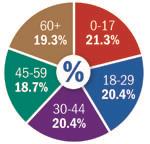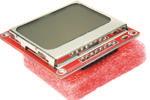When it was announced back in 2013 that Hull had been awarded the City of Culture for 2017, the Yorkshire city had no hesitation in embracing its new title. Hull’s time in the spotlight kicked off at the New Year with a firework display by the river, which initiated an engaging 12-month programme of events. Practices in the area are hoping this new label will help bring patients through the door.
‘There’s so much going on in Hull at the moment,’ says Valli Opticians practice manager Kayleigh Buttle. ‘Lots of buildings are being lit up in the city, it’s like having our own Disneyland. I have lived here all of my life and the festival is showing off all of the things you take for granted.’
Buttle hopes the city’s accolade will help to bring the community together. She says: ‘We are already on first name terms with a lot of our patients and the most enjoyable part of the job is the familiar faces coming into the practice. We are busier than we were this time last year, partly due to lots of people from outside Hull travelling in to have a look, and I have spoken to others in the city who have expressed a similar sentiment. Let’s hope 2017 is one to remember.’
Although there is a buzz in the air, independent practices are still feeling the pressure from the multiples in the city. Dispensing manager at Daniels Turner Opticians Carl Milson says: ‘We have got a lot of multiples in the city centre and they have big advertising budgets which don’t help us and they seem to be getting more aggressive with their marketing.’
Pressure on the practice’s business meant Daniels Turner Opticians pulled out of the local minor eye conditions service (Mecs). Milson says: ‘We used to do it but when it came up for renewal we decided we could manage without it; the paperwork was a lot to handle. If a patient rang us up with a problem of course we would see them because they were our patient, but sometimes we would get referrals who would walk into the practice for 20 minutes and then leave – it just wasn’t how to grow a business.’
 Vivian Bush (pictured left) is the fifth generation of optometrists in Hull, after his great-great-grandfather first settled in the city in the early 1860s. He now owns two practices and has adapted his business model to suit the different catchment areas. He says: ‘The practice on the east side of Hull is a very mixed community and we now see a lot of people from Eastern Europe and Africa. Patient income ranges across all social groups. On the west side we have more of a “destination practice”, serving a more affluent area, and being sought out from further afield. The income demographic encouraged us to introduce extra services like OCT as there’s an interest among people pursuing a high level of examination.’
Vivian Bush (pictured left) is the fifth generation of optometrists in Hull, after his great-great-grandfather first settled in the city in the early 1860s. He now owns two practices and has adapted his business model to suit the different catchment areas. He says: ‘The practice on the east side of Hull is a very mixed community and we now see a lot of people from Eastern Europe and Africa. Patient income ranges across all social groups. On the west side we have more of a “destination practice”, serving a more affluent area, and being sought out from further afield. The income demographic encouraged us to introduce extra services like OCT as there’s an interest among people pursuing a high level of examination.’
Who’s in town?
Total: 20
Independents: 16
Multiples: 4
Average cost
Prices for an eye examination range from £22 to £30.The average cost is £27.
Population - see pie chart

Hull: 256,406 (ONS 2014)
Community eye care
According to the Locsu Atlas Map of Optical Variation, Hull has secured a contract for NHS Hull CCG and Hull and East Yorkshire Hospitals NHS Trust in cataract post-op, glaucoma referral refinement, glaucoma repeat readings and a minor eye conditions service.
Health and affluence
- The average house price in Hull is £114,173 (Rightmove, 2016) compared with an average of £216,750 for England and Wales (Land Registry, 2016).
- NHS expenditure on vision problems in Hull per person is £76 (RNIB Sight Loss Data Tool 2015).
- 9,050 patients live in Hull with early stage wet AMD, 660 with dry AMD (RNIB).
- There are about 2,100 people living in Hull who have cataract, 2,190 people with glaucoma and 14,930 with diabetes. Some 5,090 patients have diabetic retinopathy
(RNIB).
Fun facts
William Wilberforce who led the bill to abolish slavery was born in Hull.
The boiled sweet was invented in Hull.

The liquid crystal display (LCD), above, was developed by the University of Hull.
It is the birthplace of Lemsip, Bonjela and Gaviscon.
During the Second World War, Hull was the most bombed city outside of London, with 90% of its buildings damaged.
Telephone services in Hull are provided by KCOM (rather than BT), originally established in 1904 and famous for its cream-coloured telephone boxes.
In 2013, the Deep aquarium, pictured top, was voted best family place to visit in Hull.
